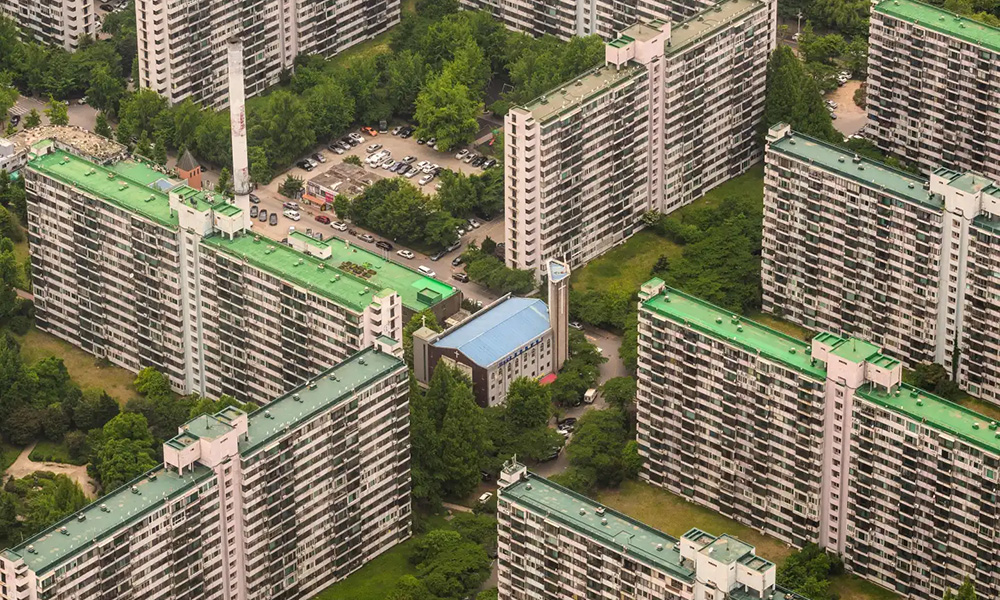
随着韩国央行长达一年的紧缩周期影响高档房地产市场,位于韩国首都首尔江南区的三个高档社区的房价开始下跌。
韩国房地产委员会的数据显示,江南区全境的公寓价格连续四周下跌,这是自韩国银行(Bank of Korea)于去年8月上调关键利率以来,该地区的房价首次出现环比下跌。
江南区房价受到的冲击,意味着韩国的紧缩政策开始对5,100万人口中的上流阶层产生影响。
虽然韩国央行的行长李昌镛告诉彭博社,房地产市场回调不可避免,并且是利好消息,但对房地产市场和家庭负债的担忧,是促使韩国银行恢复小幅升息的因素之一。
首尔市被纳入莱坊全球城市豪宅指数(Knight Frank Prime Global Cities Index)的住宅,绝大多数都是位于江南区的公寓。该指数去年创下自2008年以来的最快上涨速度,现在增速有所放缓。
全球5%最令人渴望的、最昂贵的豪宅市场降温,恰逢美联储开始加息,并且人们对全球经济衰退的担忧持续加剧。
莱坊的国际住宅研究负责人凯特·埃弗里特-艾伦说:“我预计在第三季度,随着不利的经济因素持续增多,该指数的增长率会进一步下降。”
“但我预计我们的豪宅指数的表现,将优于主流房地产市场指数,因为后者更依赖金融,因此更容易受到加息影响。”
据莱坊统计,首尔以江南区为核心的豪宅市场,是过去一年亚洲最火爆的市场,房价上涨20.9%,超过了日本东京和中国台北。
莱坊跟踪的公寓包括来美安道谷城,每套价值38亿韩元(280万美元)和Acro River Park(定价高达220亿韩元)。据韩国网站Naver报道,三星大厦广场3期的交易价格高达75亿韩元。

韩国歌手Psy的《江南Style》(Gangnam Style)音乐视频,让江南区全球闻名,它在韩国人心目中代表了财富、地位和时尚。当地有久负盛名的高中和各路名流,使它成为韩国精英们心目中的圣地。
江南区的房价下跌幅度,往往超过其他许多地区。在2012年至2014年房价下跌期间,江南区的房价跌幅超过了国内其他大多数地区。2008年至2009年全球金融危机期间,韩国的房价也出现了类似的波动。
美联储的主席杰罗姆·鲍威尔等中央银行家在今年8月曾经于杰克逊霍尔召开的会议上警告,借款成本会进一步升高,并且在一定时间内将始终居高不下,因此房地产市场将面临更大的压力。
江南区曾经是一片高低不平的农田,目前有200万名居民,包括韩国总统尹锡悦等政府高官、韩流明星以及许多商界和科技界领袖等。
当地并非所有居民都是非富即贵。今年8月,首尔遭遇了80年不遇的暴雨,江南区至少有四位居民在地下室中溺亡,这暴露出奥斯卡奖(Oscar)获奖影片《寄生虫》中所描绘的韩国社会严重的贫富差距。
这场暴雨还暴露出一些高档公寓不为人知的一面,被淹没的兰博基尼和保时捷,以及在地下停放的无数豪车。
与许多西方国家相比,韩国人通常更喜欢公寓而不是独栋住宅。在高人口密度的国家,造型千篇一律的住宅公寓占地面积更小,被认为能够更好地防止入室盗窃,管理成本更低,而且更容易交易,因为公寓的建筑规格类似。
然而,豪宅市场的初步回调并不局限于江南区。韩国国民银行在上周发布的数据显示,该银行在全国挑选的50套豪宅的房价已经连续两个月下跌。
豪宅市场降温显然表明,央行的紧缩政策正在影响到房价。
由于对金融失衡的日益担忧,韩国银行比大多数发达国家更早开始了加息周期。房价暴涨放大了韩国严重的贫富差距,引发了公众愤怒,并帮助尹锡悦在今年早些时候的大选中击败文在寅当选总统。
现在,随着房价开始下跌,形势开始逆转。但潜在购房人并没有急于寻找经纪人购买房产。
韩国银行的加息和进一步收紧政策的预期以及低成交量,让购房人相信房价会持续下跌。
野村控股的经济学家朴正宇说:“如果家庭开始去杠杆,我们预计未来几年的房价就会始终面临压力。”(财富中文网)
译者:刘进龙
审校:汪皓
随着韩国央行长达一年的紧缩周期影响高档房地产市场,位于韩国首都首尔江南区的三个高档社区的房价开始下跌。
韩国房地产委员会的数据显示,江南区全境的公寓价格连续四周下跌,这是自韩国银行(Bank of Korea)于去年8月上调关键利率以来,该地区的房价首次出现环比下跌。
江南区房价受到的冲击,意味着韩国的紧缩政策开始对5,100万人口中的上流阶层产生影响。
虽然韩国央行的行长李昌镛告诉彭博社,房地产市场回调不可避免,并且是利好消息,但对房地产市场和家庭负债的担忧,是促使韩国银行恢复小幅升息的因素之一。
首尔市被纳入莱坊全球城市豪宅指数(Knight Frank Prime Global Cities Index)的住宅,绝大多数都是位于江南区的公寓。该指数去年创下自2008年以来的最快上涨速度,现在增速有所放缓。
全球5%最令人渴望的、最昂贵的豪宅市场降温,恰逢美联储开始加息,并且人们对全球经济衰退的担忧持续加剧。
莱坊的国际住宅研究负责人凯特·埃弗里特-艾伦说:“我预计在第三季度,随着不利的经济因素持续增多,该指数的增长率会进一步下降。”
“但我预计我们的豪宅指数的表现,将优于主流房地产市场指数,因为后者更依赖金融,因此更容易受到加息影响。”
据莱坊统计,首尔以江南区为核心的豪宅市场,是过去一年亚洲最火爆的市场,房价上涨20.9%,超过了日本东京和中国台北。
莱坊跟踪的公寓包括来美安道谷城,每套价值38亿韩元(280万美元)和Acro River Park(定价高达220亿韩元)。据韩国网站Naver报道,三星大厦广场3期的交易价格高达75亿韩元。
韩国歌手Psy的《江南Style》(Gangnam Style)音乐视频,让江南区全球闻名,它在韩国人心目中代表了财富、地位和时尚。当地有久负盛名的高中和各路名流,使它成为韩国精英们心目中的圣地。
江南区的房价下跌幅度,往往超过其他许多地区。在2012年至2014年房价下跌期间,江南区的房价跌幅超过了国内其他大多数地区。2008年至2009年全球金融危机期间,韩国的房价也出现了类似的波动。
美联储的主席杰罗姆·鲍威尔等中央银行家在今年8月曾经于杰克逊霍尔召开的会议上警告,借款成本会进一步升高,并且在一定时间内将始终居高不下,因此房地产市场将面临更大的压力。
江南区曾经是一片高低不平的农田,目前有200万名居民,包括韩国总统尹锡悦等政府高官、韩流明星以及许多商界和科技界领袖等。
当地并非所有居民都是非富即贵。今年8月,首尔遭遇了80年不遇的暴雨,江南区至少有四位居民在地下室中溺亡,这暴露出奥斯卡奖(Oscar)获奖影片《寄生虫》中所描绘的韩国社会严重的贫富差距。
这场暴雨还暴露出一些高档公寓不为人知的一面,被淹没的兰博基尼和保时捷,以及在地下停放的无数豪车。
与许多西方国家相比,韩国人通常更喜欢公寓而不是独栋住宅。在高人口密度的国家,造型千篇一律的住宅公寓占地面积更小,被认为能够更好地防止入室盗窃,管理成本更低,而且更容易交易,因为公寓的建筑规格类似。
然而,豪宅市场的初步回调并不局限于江南区。韩国国民银行在上周发布的数据显示,该银行在全国挑选的50套豪宅的房价已经连续两个月下跌。
豪宅市场降温显然表明,央行的紧缩政策正在影响到房价。
由于对金融失衡的日益担忧,韩国银行比大多数发达国家更早开始了加息周期。房价暴涨放大了韩国严重的贫富差距,引发了公众愤怒,并帮助尹锡悦在今年早些时候的大选中击败文在寅当选总统。
现在,随着房价开始下跌,形势开始逆转。但潜在购房人并没有急于寻找经纪人购买房产。
韩国银行的加息和进一步收紧政策的预期以及低成交量,让购房人相信房价会持续下跌。
野村控股的经济学家朴正宇说:“如果家庭开始去杠杆,我们预计未来几年的房价就会始终面临压力。”
译者:刘进龙
审校:汪皓
Property in Gangnam — a trio of exclusive districts in South Korea’s capital, Seoul — is beginning to buckle as the central bank’s yearlong tightening cycle weighs on the luxury real estate market.
Apartment prices in all Gangnam districts have declined for four consecutive weeks, data from the Korea Real Estate Board show, portending the first monthly decline since the Bank of Korea began raising its key rate last August.
The hit to Gangnam signals the impact of policy tightening is now reaching into the upper stratum of Korea’s 51 million people.
While Governor Rhee Chang-yong told Bloomberg that a housing correction was unavoidable and has a desirable element, concern over the property market and household debt are among factors that have prompted the BOK to return to smaller rate increases.
Gangnam apartments make up an overwhelming majority of Seoul homes factored into the Knight Frank Prime Global Cities Index, which has slowed after rising last year at the fastest pace since 2008.
The cooling momentum among the world’s most desirable and expensive 5% of homes coincides with the start of the Federal Reserve’s rate increases and rising concern about a global recession.
“My expectation is that we will see the index’s rate of growth slow further in the third quarter as economic headwinds mount,” said Kate Everett-Allen, head of international residential research at Knight Frank.
“But we expect our prime index to outperform our mainstream housing market indices where there is a greater reliance on finance and therefore more exposure to the rate rises.”
With Gangnam at its heart, Seoul’s prime real estate was Asia’s hottest in the past year, jumping 20.9% and outpacing both Tokyo and Taipei, according to Knight Frank.
Apartments tracked by Knight Frank include Raemian Dogok County, which costs up to 3.8 billion won ($2.8 million) per unit, and Acro River Park, priced at as much as 22 billion won. Samsung Tower Palace 3rd traded for up to 7.5 billion won, according to Korean portal Naver.
Made internationally famous by Psy’s “Gangnam Style” music video, the districts symbolize wealth, status and chic among Koreans. Their cluster of prestigious high schools and network of influential residents make the neighborhood a Mecca for South Korea’s elite.
Still, when Gangnam falls, it tends to drop harder than many other areas. During the 2012-2014 downturn, Gangnam declined further than most of the rest of the country. Similar volatility was recorded during the 2008-09 global financial crisis.
Further pressure is likely to come, too, with central bankers including Fed Chair Jerome Powell warning at August’s Jackson Hole meeting that borrowing costs are headed even higher and will remain elevated for some time.
Gangnam, once rugged farmland, is now home to 2 million people, including high-level officials such as President Yoon Suk Yeol, K-pop stars and an array of business and tech leaders.
Not everyone in the districts is rich and famous. When the heaviest rainstorm in 80 years hit Seoul in August, at least four Gangnam residents drowned in the basement homes that came to symbolize Korea’s deep wealth inequality in the Oscar-winning film “Parasite.”
The torrential rains also exposed unexpected gaps in some luxury apartments, submerging Lamborghinis, Porsches and hundreds of other luxury cars parked underneath them.
Koreans as a rule prefer apartments to standalone homes, in contrast to many Western countries. The cookie-cutter buildings take up less space in the densely-populated country and are viewed as safer against burglary, cheaper to manage and easier to trade because they are built to similar specifications.
The incipient correction in luxury homes isn’t limited to Gangnam, either. The 50 premium homes picked nationwide by Kookmin Bank have fallen for two months in a row, according to data released last week.
The cooling is a clear sign that the central bank’s policy tightening is flowing through to property.
The BOK began its rate-hike cycle earlier than most developed economies as it grew concerned about financial imbalances. Korea’s widening wealth divide, amplified by soaring home prices, fueled public anger and drove an electoral wave that helped Yoon oust Moon Jae-in in an election earlier this year.
Now, as home prices begin to fall, the tables are turning. But potential buyers aren’t rushing to brokers to try to secure a property.
The BOK’s rate rises and expectations of further tightening, together with the low volume of deals, are fueling expectations the downturn will be protracted.
“With households starting a deleveraging cycle, we expect housing prices to remain under pressure in coming years,” said Park Jeong Woo, an economist at Nomura Holdings Inc.






